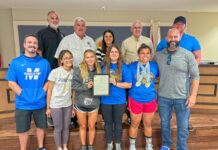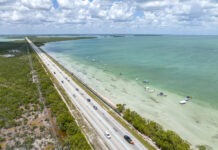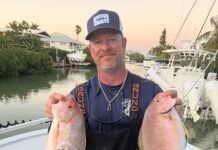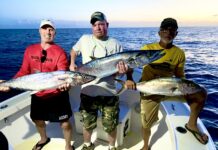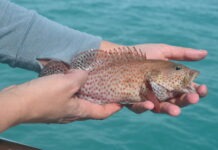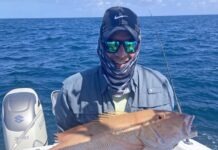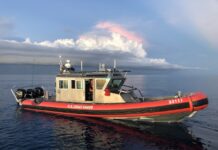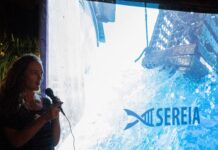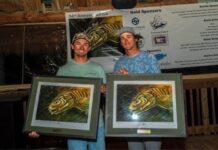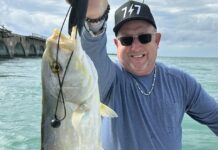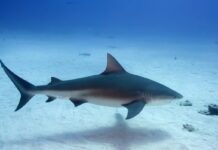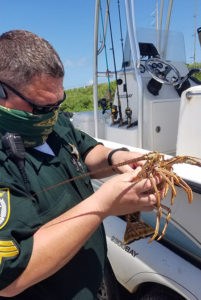
Sheriff’s Office reports no major violations during mini-season
Lobster mini-season came and went in the Florida Keys with no major violations, accidents or injuries, according to the Monroe County Sheriff’s Office. Still, the office made more stops, arrests and citations than a year ago.
In total, sheriff’s deputies conducted more than 780 vessel stops and resource checks on water and land in Monroe County. That’s up from the 597 stops and inspections deputies made during the 2019 mini-season.
Five arrests were made during the two-day season — up from the three made by deputies last year. Forty-nine citations were issued by the sheriff’s office, many for possession of undersized lobster or over-the-bag limits. That’s slightly up from the 40 notices issued last year for court appearances for undersized and over-the-bag limit violations.
Among the violations seen by deputies this year, a South Carolina man was cited for possessing a queen conch, a protected species. A Maryland man was issued a notice to appear in court as he was found to be in possession of three undersized mangrove snapper. A total of 166 warnings were issued.
Eight sheriff’s boats were used, including one unmarked vessel and four Yamaha WaveRunners, which are donated for use every year to the Sheriff’s Office by Riva Motorsports & Marine of the Keys in Key Largo. The OH-58 helicopter and special land-based details of deputies to check bridges, canals and right-of-ways, were all deployed by Sheriff Rick Ramsay for the 2020 mini-season.
“I wanted a strong presence out there this year on air, land and water,” Ramsay said. “The helicopter is a great tool as it provides an effective deterrence to law breakers as well as being at the ready for search and rescue missions. We employed a very large, multi-pronged approach and the figures reflect that.”
Data provided by the sheriff’s office doesn’t include figures from the Florida Fish & Wildlife Conservation Commission, Key West Police Department, Key Colony Beach Police, Florida Highway Patrol or the U.S. Coast Guard.
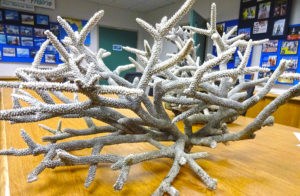 Coral harvested illegally
Coral harvested illegally
Renter on Key Largo issued court notice
On July 29 at about 08:30 p.m., investigator Chris Mattson of the FWC received information that renters at Landings of Largo (located on Key Largo) had large specimens of staghorn coral drying out on their balcony. Mattson and officer Brett Swenson of the FWC went to investigate. They found a man named Christopher Curlee of North Carolina had the coral.
Mattson contacted Lt. Josh Peters of the Coral Trafficking Task Force, a partnership between the Florida Fish and Wildlife Conservation Commission and Florida International University (FIU). Photographs of the coral were sent to the task force. Cristina M Gomes, assistant director of the Tropical Conservation Institute, Institute of Environment, and Robert Tomasetti of the Department of Biological Sciences of FIU positively identified the coral as Acropora Cervicornis (Staghorn Coral). This species is protected under the Endangered Species Act and is unlawful to possess.
Curlee was issued one notice to appear for violating the Endangered Species Act. The staghorn coral was seized for genetic testing by the task force to determine which specific reef of the Florida Keys National Marine Sanctuary it was harvested from, due to the lack of genetic diversity left in this endangered species. — Contributed
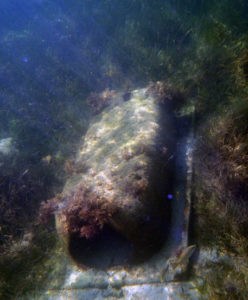 FWC makes case in Tavernier for illegal lobster harvest
FWC makes case in Tavernier for illegal lobster harvest
On July 29 at about 12:30 p.m., Lt. Joshua Peters of the Florida Fish and Wildlife Conservation Commission was on water patrol in uniform on an unmarked vessel equipped with blue lights and siren. He was patrolling Key Haven Basin, inside the Florida Keys National Marine Sanctuary.
He saw two vessels at anchor atop a known and previously documented site of artificial habitat. This site was thoroughly documented with photographs and video during Operation “Bugging Out.” He approached the vessels and witnessed several occupants from both vessels actively harvesting Florida spiny lobster from the artificial habitat. Peters ordered everyone in the water back to their respective vessels and conducted a marine fisheries inspection.
The inspection revealed that the two vessels were owned and operated by Coastal Outfitters Inc. of Tavernier. In total they had 11 paid passengers among the two boats, eight of whom were actively harvesting from the artificial habitat. The captains were identified as Donald Wayne Webb Jr. of Tavernier and Thomas Salvatore Giamo of Homestead. Giamo did not have a valid USCG Merchant Mariner Credential with him at the time of the boarding. He told Peters he had forgotten it. On July 31, Peters contacted USCG Sector Key West and verified Giamo does not have a Merchant Mariner Credential.
Interviews of the harvesters/occupants were conducted in which they admitted that all of the lobsters on board the two vessels were harvested from this artificial habitat. They said they had no idea it was illegal to harvest lobster from artificial habitat and that they had booked a charter to take them on a lawful trip because they were not local and did not know all of the rules and regulations. Because they were harvesting lobster from artificial habitat under the direction of Giamo and Webb, the two captains were given notices to appear for misdemeanor violations of harvesting lobster from artificial habitat.
The two vessels were in possession of 39 lobsters, all of which were harvested from artificial habitat. The case will be forwarded to a Coast Guard investigator with regard to Giamo conducting charters without the appropriate Merchant Mariner Credentials.
— Contributed







